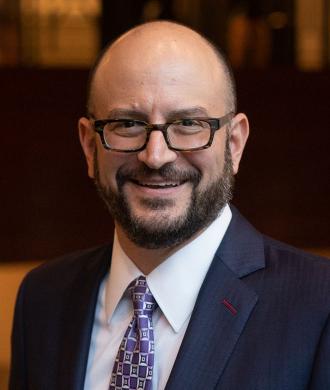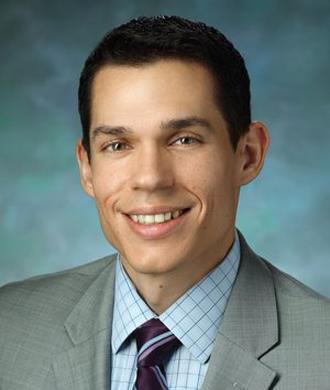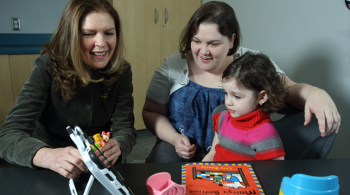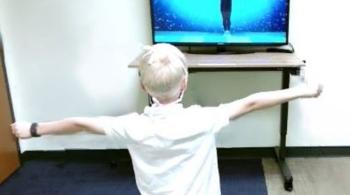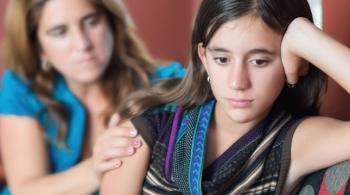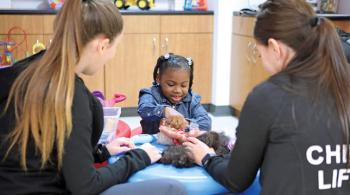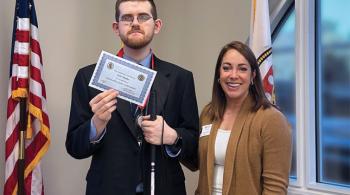Tourette syndrome and tics—what are these two neurological disorders, how do they differ and how are they treated is the subject of this month’s episode of Your Child’s Brain.
Join Dr. Brad Schlaggar, president and CEO of Kennedy Krieger, along with four of his colleagues from the Institute’s Tourette Syndrome Center of Excellence.
They are:
- Dr. Harvey Singer
- Dr. Marco Grados
- Dr. Joseph McGuire
- Dr. Shannon Dean
Links to visit:
- Tourette Syndrome Center of Excellence at Kennedy Krieger Institute and Johns Hopkins Medicine
- Tourette Association of America
Learn More About Our Featured Speakers
Learn More About Our Featured Speakers
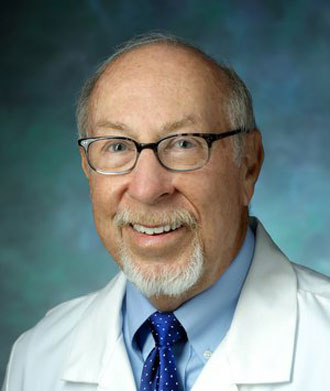
Harvey Singer, MD

Shannon Dean, MD, PhD
View Episode Transcription
Dr. Brad Schlaggar (BS): Welcome to Your Child's Brain, a podcast series produced by Kennedy Krieger Institute with assistance from WYPR. I'm Dr. Brad Schlaggar, pediatric neurologist and President and CEO of Kennedy Krieger Institute. It has been nearly 200 years since Dr. Jean Marc Itard described the first person with what would eventually be called Tourette syndrome. In Paris, France 1825, he wrote a paper about a seven year old girl with involuntary movements and sounds and 60 years later, that same patient was part of a series of patients described by Dr. Georges Gilles de la Tourette, also in Paris, with a similar set of features leading to his name being attached to a syndrome of pediatric onset involuntary, highly stereotyped movements and sounds called tics that can but don't always persist into adulthood. Because the movements and sounds appear to be impulsive, uncontrollable behaviors. For decades, the condition was widely considered to be behavioral, not neurological. But as we've discussed on this podcast in multiple prior episodes, that distinction between behavioral, neurological, or neurobiological is really a false distinction because all behavior comes from the brain. In the late 1960s, doctors Arthur and Elaine Shapiro described that a medication called haloperidol, which blocks a subset of dopamine receptors in the brain, could treat tics and that discovery catalyzed a paradigm shift for how the medical field thought and thinks about Tourette syndrome and ushered in a new era for approaches to treating what for some can be a very disruptive and disabling condition. Tourette syndrome was once regarded as quite rare. When I was a first year medical student in 1986, we learned that its prevalence was about one in 10,000. But over time and with increasing recognition, we now understand it to occur in around 1-3% of school age children and adolescents with around 20% of children experiencing ticking at some point in childhood. Over the past 30 years, in particular, we've learned a great deal about Tourette Syndrome along with related conditions. It's neurobiology, the role for genetics, approaches to treatment, and more. Today I'm very excited to be joined by four of my exceptional colleagues from Kennedy Krieger and Johns Hopkins Medicine. Who are among the leading clinical and scientific experts in the field and are part of our Tourette Syndrome Center of Excellence. They are Dr. Harvey Singer, a pediatric neurologist, and he's an emeritus professor of neurology at the Johns Hopkins University School of Medicine. Dr. Marco Grados, a child and adolescent psychiatrist, is the co-director of our Center of Excellence. He's also a professor of Psychiatry and Behavioral Sciences at the Johns Hopkins University School of Medicine. Dr. Joseph McGuire, pediatric psychologist with expertise in Tourette syndrome and related disorders, is an associate professor of Psychiatry and Behavioral Sciences at Johns Hopkins and Dr. Shannon Dean, a pediatric neurologist, in Kennedy Krieger's Department of Neurology and Neurogenetics with expertise in movement disorders and experimental therapeutics, as an assistant Professor of Neurology at Johns Hopkins. I should also say that the Center of Excellence designation comes from the Tourette Association of America and for full disclosure, I serve on that organization's scientific advisory board. Harvey, let's start with you. I mentioned in the introduction that Tourette Syndrome is a pediatric onset neuro psychiatric disorder characterized by tics which are a particular involuntary movement and for sound. Let's dive a bit deeper. What is a tic? What is Tourette's syndrome? How common is it and when does it start?
Dr. Harvey Singer (HS): In terms of the definition, tics are quick, rapid, sudden, repetitive, involuntary movements or sounds. For example, a movement example would be repetitive blinking, facial grimacing, head jerking, shoulder movements. You can also have more complicated things putting together a variety of these simple movements. Also, spinning, hopping, holding in a position. In contrast, vocalizations, simple ones, grunts, sparks, hoots, hollers, moans, groans, throat clearing is very common and more complex things involve the use of words. Repeating words, your own words, other people's words, and we'll talk more about foul language later. So, when does it begin? Typically, the age range is approximately 3-8 years we expect tics to begin. Usually, they occur before approximately age 12. In terms of what the definition of Tourette syndrome is, I mean, basically, formally, it requires the presence of multiple motor and at least one phonic vocal tic for more than a year, and that's the criteria. It's approximately 1% of kids, although in all fairness investigators have thought that there may be an additional 1% who have never been diagnosed. We're talking about a relatively common phenomenon.
BS: Marco, Tourette syndrome is commonly accompanied by other conditions such as ADHD or Obsessive Compulsive Disorder. Can you elaborate on the kinds of co-occurring conditions, or comorbidity seen with Tourette? Let's spell out a more complete list and how often they occur.
Dr. Marco Grados (MG): One way to look at Tourette's syndrome is a picture of an iceberg. Where we have the motor tics and the vocal tics at the top, but underneath lies much more. The two conditions that are most commonly associated with Tourette syndrome are OCD, Obsessive Compulsive Disorder, and ADHD, Attention Deficit Hyperactivity Disorder. In fact, these conditions tend to run in families. If you have a patient with Tourette's, OCD is the occurrence of obsessions, which are intrusive thoughts, ideas, images, urges, and compulsions, which are ritualistic behaviors. About a third of patients with Tourette's will have full blown OCD, while most patients with Tourette's will have some features of OCD. Especially touching, tapping compulsions, and also aggressive intrusive thoughts tinged with anxiety. Anxiety is also a very common occurrence in patients with Tourette syndrome. As for ADHD, up to 70% of patients with Tourette syndrome will have some form of ADHD. Full blown ADHD, in many cases. That's characterized by hyperactivity, impulsivity, problems organizing, inattentiveness. All these symptoms often can cause more disruption in the patient's family and patient than Tourette's and tics themselves. Very important to look out for these conditions and diagnose them and provide specific treatment.
BS: Shannon, Tourette is a specific kind of tic disorder, there are others. How does it differ from those other tic disorders and to what extent do those distinctions matter from a clinical perspective?
Dr. Shannon Dean (SD): There's four tic disorders that we think about. The place where the distinction really matters is between what we call provisional tic disorders and the various kinds of chronic tic disorders. The distinction between the provisional tic disorders and the chronic tic disorders is based on time. As we've already alluded to Brad, tics are actually pretty common in young kids in those preschool to early grade school years. Up to 20% of kids will briefly have tics sometime during those years and for many of those kids, the tics will last a few weeks, maybe a few months. They may not even be strong enough that anybody notices them and then they'll go away on their own. We don't want to label something that is harmless that we see in 20% of otherwise healthy kids who are doing well as a disorder. If you've only had your tics briefly, we call that a provisional tic disorder because we don't really want to say that those 20% of kids whose tics are going to go away have a disorder at all. If however, your tics have come and gone, and come and gone for a longer time, and our arbitrary cutoff is a year, then you have some form of chronic tic disorder. If you have only ever had what we call motor tics. So tics that are primarily movements, your shrugs, your blinks, etc, then you have a chronic motor tic disorder. If you have only ever had tics that are some kind of sound, not just words, but sniffs and snorts and coughs and things like that, then you have a chronic vocal tic disorder. If you have both, then you meet criteria for Tourette syndrome. Now, we used to consider Tourette syndrome to be more severe than a chronic motor tic disorder or a chronic vocal tic disorder, but recently people have really started to question that. It's certainly true that if you have more tics in general, unsurprisingly your tick disorder tends to be worse. But it doesn't seem like the type of tics is where it really makes sense clinically to draw that line, because there are kids that only have a few tics and only have relatively mild tics, but one of their tics happens to be a sniff and another one happens to be a blink. That child technically meets criteria for Tourette syndrome, they're not more severe than another kid with mild tics who happens to only have motor tics. Those are the distinctions we use right now. But it's possible the next time the guidelines are revised, some of the differences between the chronic tic disorders are going to possibly go away.
BS: Shannon, sticking with you, and we've been talking a bit about the natural history of Tourette syndrome and tic disorders, in general, let's dive in a little bit deeper there. Also, can you describe when a child comes to you and has new onset ticking, what's the conversation like with the family about what they can expect?
SD: Usually, what I do is, I first try to establish how long these tics have been happening. I try to really drill down, because the first time a tic was significant enough that the family paid attention to it may not be the first time they really had a tic. I'll ask them, before this in retrospect, were there periods when your kid had a lot of funny blinking or had mystery sniffing that was thought to be allergies, but you could never find the allergen, that kind of thing? Assuming that tics truly have been occurring for less than a year, I explain that there's a very good chance that these tics are going to go away at some point, and that there's really no need for further concern. But I also, even in those kids, talk a little bit about what chronic tic disorders look like, because some small percentage of those kids are going to continue to have tics for longer term, maybe 10% of the kids that have a provisional tic disorder. For those kids, particularly if I already know that they've had tics for more than a year, I'll explain that tics tend to come and go, that they are benign, and are only as much of a problem as there are a problem. In other words, if the tic bothers the child, that might be a reason for intervention, but if the tic isn't particularly causing the child any harm, then we may not need to do anything. I also talk about the natural history. What we expect, as Harvey already mentioned, is that, kids are going to start to have their tics somewhere in those pre-school, early grade school years. We expect that their tics may increase in the run up to middle school, somewhere between 9 and 11 or 12, a lot of kids have a peak in their tic activity. I do prepare families for that possibilities, but I also tell them that the good news, is that, for up to 80% of kids, their tics are going to improve later. Somewhere in the teens, maybe even in the early 20s. The tics as they are at 9 to 11 for most kids isn't going to be how the tics are for the rest of their lives. For many people, if this disorder is bothersome enough that there's something we need to do about it, that's only true when they're relatively young. As they get older, they kind of age out of tics being frequent enough or significant enough for them to really cause the many issues.
BS: Harvey, probably the most famous feature of Tourette syndrome is what is generally called coprophenomena; saying foul things or making foul gestures. It seems like every time Tourette is portrayed in popular media, the person has this feature. Can you describe more? What are the coprophenomena? How often do they actually occurr?
HS: It might be worth starting with the definition. Actually, kópros is Greek for fecal matter excrement. Obviously, when we talk about phenomena, that's an action. Coprolalia. Lalia means talk, speech, so foul language while you're speaking. Examples would be, and I'm not going to say it here, the F word or other words that you can think of. Obscene words, profanity. Then there's copropraxia, i.e., movements that are foul, if you will, i'e., giving the finger. I won't demonstrate. [OVERLAPPING].
BS: Thank you.
HS: [LAUGHING] And so interesting phenomenon involving foul gestures, words. It actually occurs statistically in about 10-19% only of individuals with Tourette syndrome. Although lots of parents or others worry about coprophenomenon, actually it's pretty uncommon in individuals with Tourette syndrome.
BS: That's right. Marco, in medicine, we often talk about the idea of a differential diagnosis list. It's a way of making sure that we, as physicians, were thinking of all the possibilities that could explain a condition. What is the differential diagnosis for when a person comes to clinic ticking? What are you thinking about?
MG: The way I would frame the differential diagnosis for Tourette syndrome might be in the psychiatric ones and the neurological ones. For the psychiatric, we have a condition called functional neurological disorder. The older term was conversion disorder, where patients present with unusual movements that have started in an atypical fashion for Tourettes at later ages, they're very severe, they're very dramatic. We're still working out the treatment. This occurred mostly during the COVID pandemic. Another differential that could be considered would be restlessness related to ADHD or another form of anxiety. These can usually be differentiated from tics which are described, of course, as stereotypic, repetitive, same all the time suppressible urges to move. But I'd let Dr. Singer speak, perhaps, to the movement disorders differential.
HS: You want to be sure that the individual indeed has tics, that's the movement disorder that you are seeing and observing. If an individual has tics, then the differential diagnosis has to take into consideration the possibility of other associated medical conditions. For example, tics have been associated with some infectious problems like encephalitis or [inaudible 00:16:29]. There's some association with various medicines. Some neuroleptic drugs. Cocaine has been reported to induce tic activity. You can also see it post carbon monoxide poisoning. It's also rarely associated with several neurodegenerative disorders. The bottom line then is to make sure that there's no other issue. For example, sometimes we'll see it post stroke or post trauma cases have been described. The important thing is here to do a careful exam just to make sure whether there's any other associated neurologic condition. Obviously, as Dr. Grados mentioned, it's important to consider whether this is or is not a functional, i.e., psychogenic movement disorder.
BS: Harvey sticking with you and along these lines of what you just laid out in terms of the differential diagnosis, how is Tourette diagnosed? Do you need to do brain imaging or laboratory tests, for example?
HS: No. So, obviously, the common question asked by parents, and the bottom line, is that, one, this is a diagnosis made by history. What's the history of the tics, and the individual observation? It is very important that you try to observe the movements. You may not see them in your office but get that video. Nowadays, it's very easy for parents to film the movements on their cell phones. The other part is a careful comprehensive examination to make sure that there's nothing else going on. If all those fit the diagnosis of, say, Tourette syndrome or one of the other tic disorders, it is usually not necessary to do any additional further work up, but rather to explain to the patient and the family exactly what is going on.
BS: I just want to underscore the importance of capturing any movement or behavior where a parent is unsure of what's going on. Capture it on video. It is so much more effective for the evaluating clinician to have a look for themselves rather than to hear a description of it.
HS: We agree, because sometimes when the parents describe it, how you get a visual image in your mind, and occasionally, when you get to see that video, it was not what you were thinking. Again, as we teach medical students and other physicians, get that video.
BS: Exactly. Joe, I'm going to direct this one to you as the psychologist on this panel of experts. In multiple episodes of this podcast, we've talked about the idea of neuropsychiatry and the recognition that neurological and psychiatric conditions are brain based. With that in mind, if you will, let's consider whether Tourette syndrome is neurological, psychiatric, psychological, and do these distinctions really matter?
Dr. Joseph McGuire (JM): I mean, I think it's really all of the above. While tics are neurological in nature, we know that there are internal and external factors by both psychiatric and psychological that can really influence the expression of tics. While it may be innate in the brain, also we know there's different modifiable factors that we can do that influence tic expression. In terms of does it really matter? I think one of the strengths of what we do here at the Kennedy Krieger Institute is, we have an interdisciplinary team where we're bringing everybody to the table to share their expertise and perspectives on this condition. What we're able to do is put together comprehensive treatment plans. I think that's the important part, is really addressing everything when thinking about that patient with Tourette syndrome.
BS: Let's shift our focus to thinking about treatment approaches for Tourette syndrome. There's good evidence for both pharmacotherapy or treatment with medications and for behavioral therapy. Shannon, can you talk a bit about the medication approaches, and then I'll ask Joe to talk about behavioral therapy.
SD: In terms of medication approaches, again, and I already mentioned this briefly before, Brad, the first thing you need to ask is, do these tics need to be treated at all? You really want to make sure that this tic is, in some way, causing harm to the child that is worse than risking any potential side effects. That could mean that the tics hurt, it could mean that they're embarrassing and the child is getting teased or they're embarrassed enough about them that they don't want to go and spend time with their friends or it could mean that they're disruptive in some way in the classroom, at part time jobs, things like that. Assuming that they are severe enough that they do warrant treatment, usually people think about medications in terms of your first tier of medications, which are generally milder and have fewer side effects, and then your second tier of medications for folks who have tried these other things, and still are really bothered by their tics, and haven't responded to what we've tried before. The most commonly used medications are in that first tier of things like guanfacine and clonidine. Parents may know this as intuitive, for example. These are medications that we also use actually as add on medications for some of the comorbidities of tics. It's an add on medication for ADHD, it's an add on medication for anxiety, although it doesn't tend to be strong enough as a solo agent for either of those conditions. But they also do seem to suppress tics pretty well. They're pretty well tolerated. The big side effect that we have to worry about is sleepiness, but if we go slowly, usually that's manageable. Clonidine is similar, but tends to cause even more sleepiness. A lot of people prefer guanfacine for that reason. Unless the tics are mild enough that they only barely need treatment and the kid is having trouble sleeping anyway, that might be a reason to pick clonidine. The other Tier 1 medication that is used sometimes is topiramate. It seems to work about as well as guanfacine and clonidine, but it doesn't help with any of the common comorbidities. It does help for migraines. If kids have migraines, and they don't have anxiety, and they don't have ADHD, it can be a reasonable first choice in your typical kid. Usually you're going to get more bang for your buck with those other agents. If those things fail, then we start to use what we call neuroleptics or antipsychotics. These are medicines like Risperdal, Abilify, even Haldol. These medications do have more potential side effects. That includes metabolic side effects, that includes liver irritation or kidney irritation, and that even includes things like other movement disorders being caused by these medications or cognitive changes or things like that. The tics usually need to be pretty severe before we're really going to those medications, and we need to have tried other approaches, and found that they weren't successful.
BS: Joe, you want to talk about behavioral approaches?
JM: The American Academy of Neurology, American Academy of Child Psychiatry, and pretty much every practice parameter guideline suggests that behavior therapy, when intervention is needed, is the first line treatment for tics. Behavior therapy is a pretty broad term that we talk about. It can either be habit reversal training or the comprehensive behavioral intervention for tics. In terms of habit reversal training, what it does is, it teaches patients and families first a little bit to acknowledge that tics are neurological in nature, but we can do things that influence the expression of tics. What I mean by that is, we know premonitory urges that were talked about a little bit earlier tend to be related to the expression of tics. The best example I can give is from a six year old who I saw a few years back, and he said every time he felt an itchy in his throat, he did a fluffy, which was his throat clearing tic, and it took the itchy away. I think that really highlights how the relationship between premonitory urges and tics. In habit reversal training, we say, hey, there's a relationship between premonitory urges and tics, and we start to build awareness around the tic, and trying to figure out when it happens, and then also think a little bit about when that premonitory urge starts to happen. Once we have greater awareness, we start to implement competing responses. Competing responses are just behavioral strategies that we can use to inhibit the expression of the tic. Over time, what happens is, we start to discontinue that relationship between having that premonitory urge and that expression of the tic, and the tic starts to go away, and many patients also report that premonitory urges go away. The difference between CBIT and habit reversal training is, CBIT says, well, that's great that you understand these premonitory urges, but there's also things like going to school that makes tics worse. Stressful situations that makes tics worse. Let's put together some strategies to deal with those factors outside the body; these external environmental factors, and come up with a strategy or interventions to address them. For example, if I have a lot of tics when I'm doing homework, that might be a great time to actually practice competing responses so that I'm able to better get control over those tics during that setting. That doesn't mean that I stop doing homework, but I work my way to being able to get through it by empowering the child to use competing responses during that time. Last but not least, a lot of behavior therapy is contingent upon practice. What I often tell patients and families is, the more you practice, the better you get. If you're practicing, you're going to experience some of those benefits.
BS: Harvey, do you want to comment about it?
HS: Yeah, just two quick comments. One is, Marco mentioned that individuals with Tourette syndrome often have other problems. It is essential that the examining physician help to determine what's the biggest problem, because in many individuals, again, it is not the tic you have to identify because the treatments are different. The treatment for, say, anxiety is different from that from Tourette. Again, you have to get the proper diagnosis, and know what the treatment is for.
BS: Yes, the tic may have been the thing that brought the child to medical attention, but once in the room, you learn that it's really anxiety or OCD that's the driver, and so that has to be prioritized.
HS: Absolutely. Another point, is that, parents go online and read about what's known as complimentary and alternative medications, i.e., the use of vitamins, so B6, B12, minerals, magnesium, Omega fatty acids. I'm not saying that these are harmful for the individual, except that there is no good scientific evidence to support their use in Tourette syndrome.
BS: Whereas there's actually a fair amount of good clinical trial evidence supporting the medications that we've been talking about, and supporting the behavioral interventions that Joe just mentioned, that CBIT that has stood up to rigorous clinical trials. I should say that Joe was part of the coming to fruition of that evidence based intervention over the past 15, 20 years. Joe, so going back to you, let's talk about age, and when is an okay time to start implementing. Can you be too young for CBIT, for example?
JM: That's a great question, and one that comes up a lot. Right now in those clinical trials that you referenced, patients were as young as eight and as old as 69. Really, behavior therapy works across the lifespan. There are some, and parents will say, well, can we start treating it as early as six? What we've done is, we've come up with some adaptations to CBIT which are really parent focused or parent lead. Teaching parents how to implement habit reversal training and other behavioral therapy skills for those 6-8 year olds. It's not the exact same type of treatment that you might do if you're working directly with a child and a parent together, but there's still a lot of these same skills. You're never too early. That being said, it comes down to what did one patient say, well, is the juice worth the squeeze? Which I always kind of thought was funny. But what they meant by that is, this is a lot of hard work. We're dedicating a lot of time and energy, are the tics bothersome enough that it's worth that time and that energy? In some cases, the answer is yes, because they're interfering with school work, they're causing problems at home or making difficult situations with friends and family. If they're not getting in the way, it may not necessarily be worth that amount of time they were dedicating to fixing them at this moment in time.
BS: Harvey, we mentioned a couple times now the high comorbidity of ADHD and Tourette syndrome, and typically, ADHD starts earlier than Tourette. A very commonly expressed concern, is that, stimulant medication like methylphenidate, often used to treat ADHD, is the culprit for bringing on the ticking. Is that concern a real one? What do we know about the relationship between stimulant medication and ticking?
HS: A great question that we often hear from parents about. Again, approximately in the 1990s, there was a lot of concern raised by physicians, parents, so forth, that as you point out, stimulants might make tics worse. A variety of studies were actually performed, and so the scientific data does not support that the use of stimulant medications makes tics worse. If somebody has attention deficit and they need to be treated, if their physician elects to use a stimulant medication, we have no objections, again, because we have no proof that it is the stimulant that might make the tics worse. Remember, tics fluctuate. If I'm drinking water doesn't mean the water made my tics worse.
BS: Exactly. Joe, let's shift to the life outside of the clinical space. Let's go to school. How does having Tourette syndrome impact a child's education?
JM: There's a few different ways that having Tourette syndrome can impact a child's education. And we talked a little bit about co-occurring conditions and other co-occurring challenges. One of those is a lot of young people with tics and Tourette syndrome will have learning disabilities or unique learning challenges. Really first assessing for those whenever doing an evaluation, so this way we're able to separate out what's attributed to tics versus what might be attributed to something else going on, and that's always the case with Tourette syndrome. In terms of tics, specifically, if you think about vocal tics, they can really disrupt a lot of classroom activities, chirping, barking, and somebody may have to actually leave the classroom so they can manage those tics in return. In terms of motor tics, if I have a big arm jerk or something else is going on, it's going to make doing school work really hard. It's going to make sitting in that seat really hard. Now, does that mean we don't have children participate in school related activities? No. We want people to be in school, we want people learning. But what it does mean is we want to think about step wise accommodations to empower kids to manage these situations and overcome them. For example, if somebody has some really bad arm tics, we may want to reduce the level of schoolwork while teaching them how to do behavior therapy strategies and skills so that as we are reducing the amount of kind of school work, they're learning how to practice and manage those tics, and over time, able to perform just like everybody else while using those skills in those classroom settings.
BS: Shannon, what kinds of feedback or guidance do you think we should provide to educators, to coaches, to other adults who interact with a child with Tourette syndrome to know best how to support that child in their endeavors, not just in school, but really in all aspects of their lives?
SD: I think the big thing that we need to remind educators and other people that work with kids about is that these kids aren't doing the movements or the sounds on purpose. If you think of it as being really itchy, you can technically stop scratching an itch temporarily, but it's really uncomfortable to do so. The kids aren't having their tics because they want to, they're having their tics because they're not comfortable if they don't let those tics out, so there's no point in punishing kids for the tics. If anything, you're going to make them worse because it's just sort of like if someone tells you, don't scratch that itch. Now you're itchier than you were before they said anything. Now, sometimes the tic is truly disruptive and it can't be ignored. In those cases, it's reasonable to brainstorm with the parents, and sometimes with the child directly on ways to modify the tic and the expression of that tic so that it isn't causing a problem anymore. For example, if a kid has a spitting tic, maybe they can spit in a tissue instead of on the floor. If they have a really loud tic, maybe you can give that child permission to leave the practice, to leave the classroom briefly, and let that tic out. The other thing I do think it's worth mentioning for people that are working with kids is one of the things that Harvey mentioned. The tics are sometimes not the problem. If you're noticing a child has tics, of course you should be letting the parents know about that. But one of the other things that you may want to be thinking about is, does this kid seem really anxious? Does this kid seem like they're really struggling, even though they're trying with organization, with sitting still, things like that, and you may want to let the parents know about that at the same time that you mention the tics.
BS: Harvey, what do we know about the neurobiological basis for tics?
HS: If you just go back historically, so initially if you go back to Rett's writing and his colleague was Sigmund Freud, they thought that this was a psychiatric disorder, and then beginning maybe 1950s, early '60s, everything shifted to become more biologic. Once you say that then, as a neurologist, we would then say, well, where in the brain is this coming from? Is it the upper layer of the cortex, deeper structures, what we call the basal ganglia? People went searching for these sites, and suffice it to say it's not clear what the primary site is which led to another hypothesis that there are pathways that go from one part of the brain to another part. I like the analogy of a race track. If people can envision a race track, you start at the start, which could be the cortex. It goes around to Basil Ganethalmus and back to the cortex. The bottom line is that if you disrupt that message going around that circuit, in any location, you might get a tic. Then the question is, well, what's the mechanism? People would like to know, well, look, if I'm a brain cell and I want to talk to my neighboring brain cell, I don't touch them. I send out a process that gets close and I release a chemical that transmits the message, something that's called a neurotransmitter like dopamine, serotonin, glutamate, Gaba and so which one of those is the problem? Then another really interesting issue is what triggers the tic? Because the individual is not having tics all the time, so what triggers it? We have lots of fascinating questions that many of which still remain the answer is vague. Again, there is no doubt that this is biologic and coming from the brain, but the precise pathway mechanism is still unclear, sorry.
BS: Agreed. Joe, let's end with a forward looking question. What kind of research is taking place and where can people go to learn more about how to participate, for example, in research that might be taking place at Kennedy Krieger Institute?
JM: Building off of what Harvey said, there's a lot that we don't know and I think that's the importance of research. We know a fair amount, but I think we're far from having all the answers. As one of my post docs is a fan of saying, we don't know what we don't know, but at least we're going to try to figure it out. Right now, there's a couple of different projects going on where we're trying to both improve our ways of understanding the assessment as well as treatment, and starting to dig at those kind of mechanisms that Harvey was talking about a little bit earlier on. We have a few projects to our Center of Excellence. One is seeing if we can actually use cameras on your smartphone to be able to detect tics in real time. So can we actually use all of these machine learning algorithms to separate out the difference between a normal movement and a tic like movement? That's just one example. We're also exploring those mechanisms underlying behavior therapy. We have a separate project going on for that, as well as even looking at a mindfulness based approach to Tourette syndrome. We talked a little bit about in seabed and in pharmacotherapy, about half of people get better, which is great, which is wonderful, but that still means half of people are not getting better. We're starting to look at whether or not mindfulness based practices can actually move the needle in terms of reducing tic severity and improve quality of life, and this directly comes from working with our patients and families who've shared that some of these strategies have been particularly helpful for them. In terms of where to go, the Tourette Center of Excellence, a website through the Kennedy Krieger Institute and Johns Hopkins Medicine, is a great place as well as looking on the Tourette Association of America, their website for research opportunities to participate.
BS: We will add those links to the page for this episode of the podcast so that people can directly click on those. Thank you to each of our guests, Dr. Singer, Grados, McGuire, and Dean. We hope that you, our listeners, have found this information about Tourette syndrome informative and helpful. Please check out our entire library of topics on Your Child's Brain at Wypr.org, KennedyKrieger.org, Wypr.org/studios, or wherever you get your podcasts. You've been listening to Your Child's Brain. Your Child's Brain is produced by Kennedy Krieger Institute with assistance from WYPR and producer Spencer Bryant. Please join us next time as we examine the mysteries of your child's brain.

